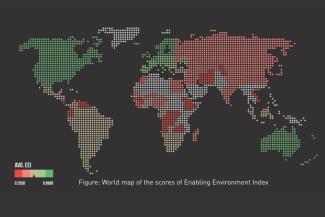Study
Civic space

Many governments claim to protect civil society. Nonetheless, most of the world’s people live in settings that do not allow them to engage in actions, organisations and movements that might improve their fate, says Danny Sriskandarajah, the secretary general of Civicus.
The authors of the report designed the Enabling Environment Index (EEI) to assess the level of civil liberties in a country. The EEI takes into account socio-economic aspects, socio-cultural aspects and governance aspects. On a scale from zero to one, New Zealand ranks best with an index of 0.87. Civicus praises the country for a low level of corruption and great respect of human rights. Germany is number 25. Civicus used the EEI to assess 109 countries. The DR Congo came in last with 0.26 points, Uzbekistan second last and Burundi third last. According to the EEI, Ethiopia is the eighth worst country for civil society activism, while Vietnam is the 10th worst. Both countries attract substantial ODA (official development assistance) from donor governments, and both are known for strong economic development.
The EEI shows that countries do not have to guarantee civil liberties to get donor support. Sriskandarajah considers this fact worrying. In his view, donor governments and international financial institutions have either not found a way to improve the conditions for civil society yet, or they are intentionally keeping their eyes shut. Barbara Mayrhofer







